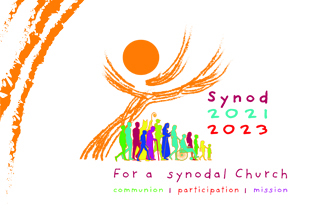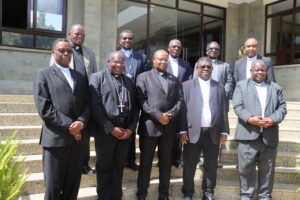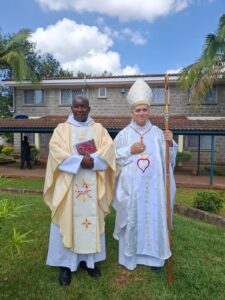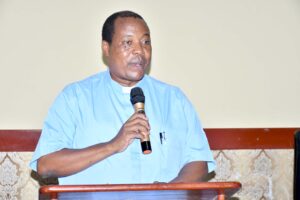VATICAN: “Synod is not Exempt from Risks,” Says Pope Francis at Opening of Two-Year Synod of Bishops

Sr. Jecinter Antoinette Okoth, FSSA
At the launch of a two-year process for Synod of Bishops aimed to encourage full participation and involvement of all the baptized of the Catholic Church on synod of synodality, Pope Francis has disclosed three risks which if not well addressed may hinder success of the Synod process.
“Synod, just as it offers us a great opportunity for a pastoral conversion in a missionary and also ecumenical key, is not exempt from some risks,” the Pontiff said while addressing delegates during the synod launch Saturday, October 9, highlighting three risks as “formalism, intellectualism and immobility.”
Speaking about formalism, Pope Francis acknowledged that a “Synod can be reduced to an extraordinary event, but a facade, just as if one were looking at a beautiful facade of a church without ever setting foot inside it.” Rather, “Synod is a path of effective spiritual discernment, which we do not undertake to give a beautiful image of ourselves, but to better collaborate in the work of God in history.”
Therefore he said, “If we speak of a synodal Church we cannot be satisfied with the form, but we also need substance, tools and structures that favor dialogue and interaction in the People of God, especially between priests and laity.”
In his observation, “Sometimes there is some elitism in the presbyteral order that makes it detach from the laity; and the priest eventually becomes the “owner of the shack” and not the pastor of a whole Church that is moving forward,” hence the reason for stressing about tools and structures on interaction between priests and laity.
Concerning intellectualism as another risk which can lead to “abstraction,” he warned during the opening of the XVI Ordinary General Assembly, making “Synod a kind of study group, with cultured but abstract interventions on the problems of Church and the evils of the world.”
This is “where we proceed in a superficial and worldly way, ending up falling back into the usual sterile ideological and party classifications and detaching ourselves from the reality of the holy People of God, from the concrete life of the communities around the world,” he said.
The Pope further stressed on the temptation of immobility as yet another risk that can make people reason “it has always been done this way better not to change.”
“Those who move within this horizon, even without realizing it, make the mistake of not taking the time we live in seriously. The risk is that it will eventually adopt old solutions to new problems: a new cloth patch, which eventually creates a worse tear,” the Pope said and continued, “For this reason it is important that the Synod be truly such, an ongoing process; involve, in different phases and starting from the bottom, the local Churches, in a passionate and embodied work, which imprints a style of communion and participation marked by mission.”
During the Saturday’s opening session for the synod slated for October 2023 and themed “For a Synodal Church: Communion, Participation and Mission,” the Pope noted that it is the Holy Spirit to guide and give graces on way forward for the entire 2-year preparation “to listen to each other and to initiate discernment in our time, becoming in solidarity with the toils and desires of humanity.”
“The Synod is not a parliament, the Synod is not an investigation of opinions (but) an ecclesial moment,” Pope Francis cautioned in his address at the new Synod hall in Vatican adding that “the protagonist of the Synod is the Holy Spirit. If there is no Spirit, there will be no Synod.”
Vatican through the Congregation for Institutes of Consecrated Life and Societies of Apostolic Life (CICLSA) in their earlier message in preparation for the synod, has urged all Christians as well as Religious men and women to “pray, reflect, discuss and share their experiences, insights and desires” and at the same time “Be open to the challenge offered by the three significant words of the theme of the Synod of Bishops on the Synodal Church: communion, participation and mission.”


